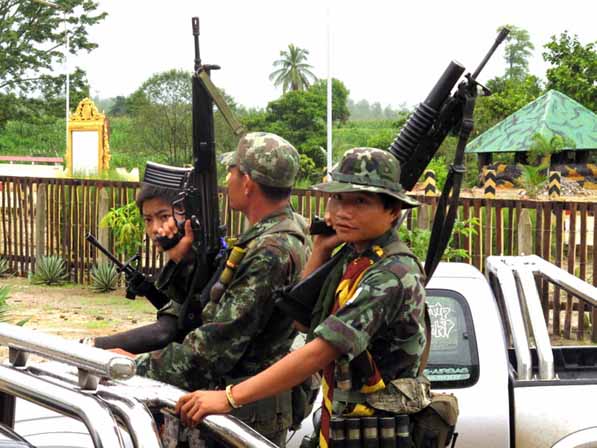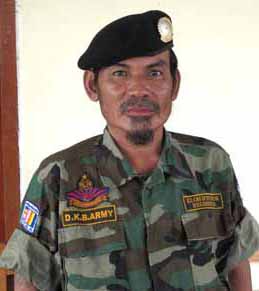Mr. Beard Breaks Away

Col. Saw Lah Pwe has led a major defection of DKBA troops, and now the remaining DKBA leaders must make a choice between their business interests and their fellow Karen
Col. Saw Lah Pwe, the commander of Brigade 5 of the Democratic Karen Buddhist Army (DKBA), led a late-July defection of as many as 1,500 troops from five DKBA battalions that will potentially join forces with the Karen National Liberation Army (KNLA).
On Aug. 5, Saw Lah Pwe met with The Irrawaddy. He said that fighting with the Burmese military was expected within 48 hours and clashes had already occurred. If the junta attacks, he will fight with the KNLA and other Karen armed groups, but will still fight as a DKBA soldier.
“I am a DKBA soldier and will fight for my people,” he said. “Even if they tell me to give them my weapons and badge, I will never hand them over—that would be like taking our bones and just leaving flesh.”
 |
| Col.Saw Lha Pwe, the commander of breakaway DKBA Brigade 5, is known as Mr.Beard (Photo:ALEX ELLGEE /THE IRRAWADDY) |
Saw Lah Pwe is believed to have persuaded his troops to split with the DKBA due to a dispute about whether to join the Burmese military regime’s border guard force (BGF). The BGF, which would require all armed ethnic cease-fire groups to come under the junta’s military umbrella, was first proposed by the regime in April 2009, and it has set an Aug. 10 deadline for the DKBA to accept the plan.
A stalwart opponent of the BGF since its inception, Saw Lah Pwe on July 21 rejected an offer by Lt-Gen Ye Myint, the regime’s chief of Military Affairs Security, to meet and discuss the plan.
The DKBA is different from the other armed ethnic groups being pressured to join the BGF. Since its Buddhist leaders broke away from the predominantly Christian KNLA in 1994 and formed their competing armed group, the DKBA has acted as a proxy militia for the Burmese military and has been engaged in an ongoing battle with the KNLA. The DKBA claims to have 6,000 troops and plans to enlarge its army to 9,000, which would make it Burma’s second largest non-state armed group.
The question now is whether the rest of the DKBA will cave in to the junta and join the BGF, which will almost inevitably lead to continued armed conflict with their Karen brethren in the KNLA, or refuse to join the BGF and pursue a more compatible relationship with the KNU and KNLA—possibly even signing an official cease-fire agreement, which will almost inevitably lead to armed conflict with the Burmese military.
Prior to April of last year, the DKBA was able to straddle the line—receiving the protection of Burma’s military regime while not officially being part of the junta and still exercising a high degree of independence. But when Naypyidaw concocted the idea of the BGF and pressured the DKBA to become its flagship member, the regime forced the breakaway Karen militia to decide which side of the line it is on. Since then, the DKBA leadership has been frozen in place, uncertain of which direction to turn.
Although the DKBA agreed to join the BGF when it was first proposed, it later backed away from its agreement, reportedly after influential Buddhist monk and DKBA co-founder U Thuzana became incensed upon learning about the DKBA’s willingness to place itself directly under junta command. Since that time, the DKBA has resisted regime pressure to join the BGF, as have most other armed ethnic cease-fire groups.
Most likely, Naypyidaw had hoped that the DKBA would be the easiest to convince of all armed ethnic groups, and that once it was on board the BGF then other groups would follow. The opposite, however, has happened. And with even the DKBA resisting the BGF, other armed ethnic groups may have been emboldened to do so as well.
The stakes for the junta are high, and it has pressured the DKBA to join the BGF to the point of threatening military action if it doesn’t capitulate. If the junta attempts to take control—by force or otherwise—of DKBA territory, some top-level DKBA leaders stand to lose a lot.
1 | 2 | 3 next page »
|
||
|
||
